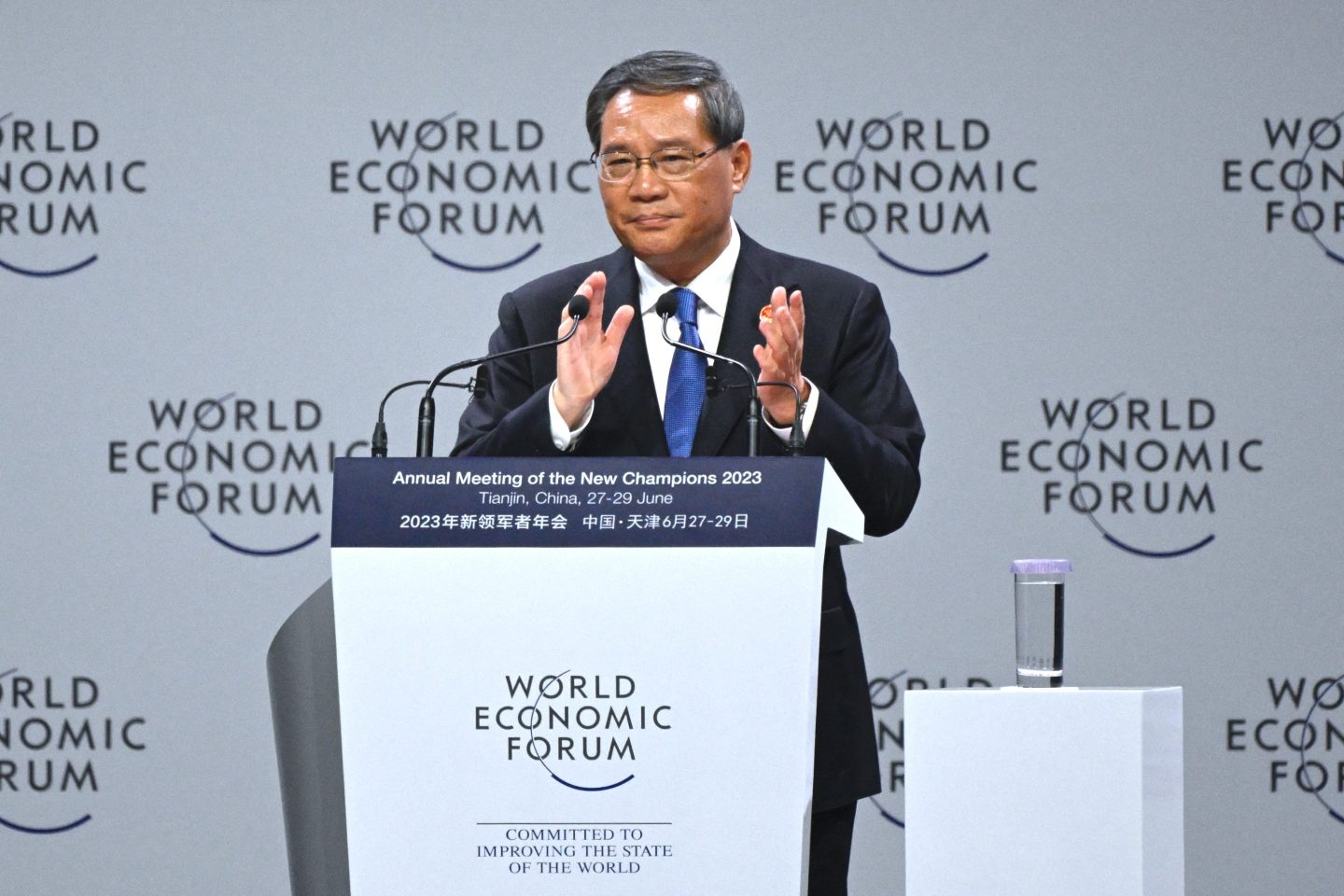Good morning, Peter Vanham here in Geneva, filling in for Alan.
Beijing is not a fan of the West “de-risking” from China and wants companies—not governments—to decide whether to deal with China, the country’s new premier Li Qiang said in his address to the global business community in the Chinese city of Tianjin on Tuesday. But Li offered little substance to reassure jittery international investors; few of them had showed up to hear his speech in the first place.
“As you know, some in the West are hyping up the so-called phraseologies of reducing dependencies and de-risking,” Li said at the World Economic Forum’s ‘Summer Davos’ in the Chinese port city. These concepts, Li said, are “false propositions.” In a globalized world, “everyone’s interests are closely entwined.” (The World Economic Forum is my former employer.)
Li, who started in his new role in March, said he favors an “open world economy” unencumbered by “overreach” or “ideological” instrumentalization by governments. “If there is risk in a certain industry, it is not [up to] a particular organization or a single government” to intervene, he said. “Businesses [should] come to their own conclusion and make their own choice” to assess such risks.
Western companies that are committed to China may find some solace in Li’s speech. The premier emphasized cooperation, dialogue, and “sincerity” to “avoid misperception and miscalculation” in China’s relationship with the rest of the world—repeating the very words U.S. Secretary of State Antony Blinken used last week in Beijing.
Still, the premier was long on ideals and imagery, but short on concrete initiatives. Despite emphasizing sincerity, Li never mentioned the U.S., Taiwan, semiconductors, or even Ukraine. And few U.S. investors attended Li’s speech: Americans made up less than 10% of participants at the 1,500-person meeting. Among them, there were no Fortune 500 CEOs.
Back in the U.S., meanwhile, Republican presidential candidate Nikki Haley showed no interest in any diplomatic or economic reset in the relations with China. In a scathing op-ed in the Wall Street Journal, she instead called on the U.S. Congress to “revoke permanent normal trade relations” with China, and expressed her wish for the Chinese Communist Party to end up “on the ash-heap of history, like the Soviet Communist Party before it.”
More news below.
Peter Vanham
peter.vanham@fortune.com
@petervanham
TOP NEWS
Low-quality ads
Google violates its own advertising standards 80% of the time, claims a new report from analytics firm Adalytics. The tech giant promises customers that video ads will only run on high-quality websites, yet the report argues that ads are often placed on websites that don’t meet Google’s stated bar for quality. The company calls the claims “inaccurate.” The Wall Street Journal
Axel Springer CEO
Current models of journalism are “totally outdated” thanks to new technology, claims Axel Springer CEO Mathias Dopfner at the Cannes Lion conference. The media mogul, who owns Insider and Politico, defended his decision to cut jobs at German tabloid Bild in favor of A.I. “When large language models can simply do it better, why would I need a person for that?," Dopfner told Fortune editor-in-chief Alyson Shontell. Fortune
Credit Suisse cuts
UBS plans to fire over half of the workforce it received from newly-acquired Credit Suisse, reports Bloomberg. Cuts to Credit Suisse’s 45,000-member workforce will start next month, with almost all divisions affected. UBS hoped to keep Credit Suisse's top employees after the merger, but many have already fled to competing banks. Bloomberg
AROUND THE WATERCOOLER
Influencers are getting blasted for a factory tour of Chinese fast-fashion giant Shein. Some ‘haul’ video creators say the brand was already sinking by Alexandra Sternlicht
SoFi used a clever trick to reverse A.I.’s biased images of women by putting a photo booth in New York City by Andrea Guzman
Pickleball has been a lifeline for seniors, but the sport’s injuries may cost Americans nearly $400 million this year by Alexa Mikhail
Venture capitalist Joe Lonsdale pitched a $2.6 billion citywide tunnel system project built by Elon Musk’s Boring Company to Austin’s mayor, emails show by Jessica Mathews
The Pregnant Workers Fairness Act goes into effect today. Here’s what workers and employers should know by Emma Hinchliffe and Kinsey Crowley
This edition of CEO Daily was curated by Nicholas Gordon.
This is the web version of CEO Daily, a newsletter of must-read insights from Fortune CEO Alan Murray. Sign up to get it delivered free to your inbox.













